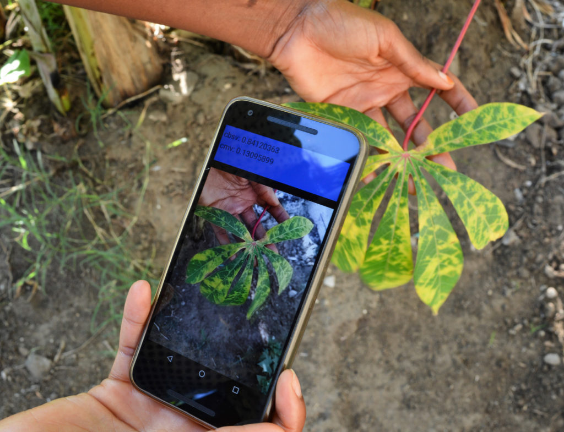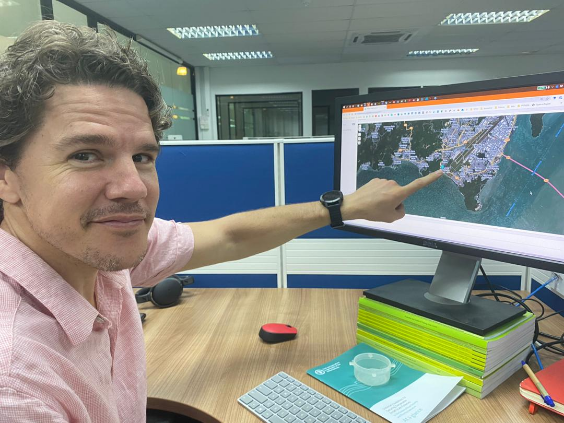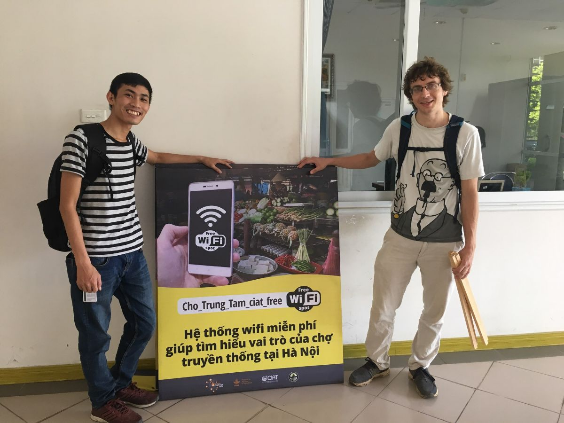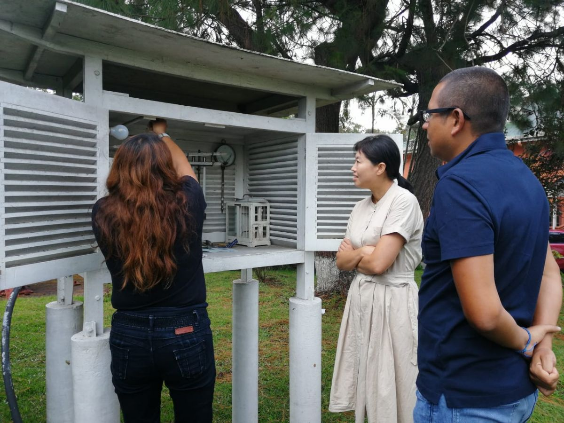|
|
|
|
2020 INSPIRE CHALLENGE - NOW OPEN
|
|
|
|
|
***
Exclusive
early launch for
BIG DATA
newsletter
subscribers.
If
you were forwarded
this message, subscribe to our newsletter to receive
important news and
updates first.
***
|
|
|
The
Inspire Challenge is
about ensuring that information
= impact.
*******
|
|
|
The Inspire
Challenge is CGIAR’s
signature digital innovation process.
It leverages the
global footprint and
deep food security
subject matter
expertise of CGIAR
with expert industry
partners to link
digital technologies
to impact in
developing economies.
The Inspire Challenge
funds novel pilot
projects that democratize data-driven insights and
which have practical
applications in
agriculture and food
security in
real-time, helping
people–especially
smallholder farmers
and producers–to
sustainably adapt to a
changing climate and
to lead happier and
healthier lives.
Through this
innovation initiative,
the BIG DATA
Platform continues to
challenge research
organizations to
partner with industry
in order to leverage public good data—especially
CGIAR data—to solve
intractable challenges
at scale.
Now in its fourth
year, the Inspire
Challenge portfolio
includes 14 groundbreaking big data projects that
run the gamut of CGIAR
expertise.
|
|
|
IMPORTANT
DATES
Partner
Search: OPEN NOW
Inspire
Challenge
launch: OPEN NOW
Partner
Search closes: 1 August
Inspire
Challenge
closes: 15 August
|
|
|
|
INNOVATION
& CRISIS
RESPONSE
|
|
|
The
2020 Inspire Challenge
will incorporate new
adaptations in
response to the crisis
that provide an
opportunity to test a
key part of our theory
of change: that data
and digital tools
bring critical
capabilities for agile
adaptation in food
systems.
Two new categories for
2020, codesigned with
funders, are directly
relevant to the
current crisis:
|
|
|
Sustaining Farm Income will
link
sustainable
practices in
food systems
directly back
to farm
income. It
provides a
mechanism for
digital
innovations
for
(re)building
resilient,
inclusive
agricultural
value chains
at a time that
will be
important for
COVID-19
recovery.
|
|
|
|
Measuring
and Building
Resilience seeks
to source
novel ways of
measuring and
operationalizing resilience in interlinked food, farming, and ecological
systems. We
expect
critical data
and digital
technologies
to include
remote sensing
and earth
observation,
high frequency
monitoring
data of any
type, and
structured
on-the-ground
research to
guide the
development of
systems and
structures
capable of
sustaining
multiple, even
concurring,
shocks.
|
|
|
|
The
two other Inspire
Challenge categories
also hold great
potential for
targeting digital
innovation towards
response, recovery,
and resilience related
to the food security
challenges unfolding
from the COVID-19
crisis.
|
|
|
Sensing and Renewing
Ecosystems links
ecosystem
services to
long-term
resilience of
food systems
(which could
include, for
example,
managing
future risk of
zoonotic
disease).
|
|
|
|
Revealing Food Systems sources
and implements
novel,
high-frequency
methods for
tracing and
understanding
food flows—an
important
capability for
monitoring and
predicting
emergent food
security
shocks before
they become
acute.
|
|
|
|
As
a result, the 2020
Inspire Challenge
startup grant
evaluation will
include specific
COVID-19 response,
recovery, and
resilience metrics
added to the judging
rubric.
|
|
|
ALL
2020 CHALLENGE
CATEGORIES
|
|
|
APPLICATION
& JUDGING
PROCESS
|
|
|
The
Inspire Challenge is a
unique opportunity for
research organizations
to partner with
industry to leverage
CGIAR public good
data. Each
Inspire proposal
must be a
collaboration
between a CGIAR
person or team and
an external
partner.
After submitting your
profile via the
simple partnership matching form, you will
periodically receive
the profiles of
potential partners who
match with your
profile, candidates
can reach out to each
other to see if there
is mutual interest.
Applicants are
responsible for their
own follow-ups.
If you already have a
partner and an idea
you are excited to put
forward for the 2020
Inspire Challenge,
this form is not a
necessary step in the
application process.
Similarly, if you
do not have an idea
yet but are
interested in
partnering on a
project to participate
in the challenge, we
encourage you to fill
out the form anyway.
Your profile may be
just what another team
is looking for.
|
|
|
The
preliminary assessment
will be conducted by
the Inspire Challenge
management team and
review each
application's
responsiveness to the
key criteria of the
Challenge.
This pre-assessment
focuses on three key
categories:
-
Meaningful
collaboration –
leveraging partners’
capabilities to
create something
more than the sum of
its parts;
-
Innovativeness
of the proposal – how
new or
groundbreaking the
idea is; and
-
Data
mobilization of
underused or
misused data –
especially
mobilizing CGIAR
data
While
the use of CGIAR data
streams is encouraged,
all forms of CGIAR +
outside organization
collaboration
demonstrating
leading-edge uses of
data are applicable
for this prize.
|
|
|
2019
INSPIRE CHALLENGE IN
REVIEW
|
|
|
In
2019, the BIG
DATA Platform received
more than 150
applications from
around the world and
awarded a total of
1.025 million USD to
eight innovative
projects at the Big
Data Convention in
Hyderabad, India.
The Platform awarded
four start-up grants
of 100,000 USD each,
and a total of 525,000
USD in scale-up funds
to four winning
projects from 2018 and
2017 that demonstrated
exceptional results,
proven viability, and
the potential for
impact.
The eight winning
teams included
collaborations between
a total of nine CGIAR
Centers and Research
Programs and 18
diverse external
partners, including
start-ups,
governmental bodies,
universities, and
private sector
businesses.
The Inspire Challenge
has begun to field
test innovations that
demonstrate new
digital pathways to
impact for CGIAR
research, foster whole
system agility and
adaptation through
digital tool use.
|
|
|
Learn
more about what
it takes to be an
Inspire Challenge
winner by reading
about the winning
projects below.
|
|
|

|
|
PlantVillage
Nuru: Pest and
disease monitoring
using AI
Penn
State, CGIAR Research
Program on Roots,
Tubers and Bananas,
CIP, Alliance of
Bioversity
International and
CIAT, IITA, CIMMYT,
IFPRI, FAO, WAVE2
PlantVillage Nuru is
transforming
farm-level pest and
disease monitoring by
using AI. The
free-for-download
phone application
works offline and has
been downloaded by
users on all
continents and used
extensively in Africa
and Southeast Asia.
-
Under
field conditions,
Nuru is two times
more accurate at
diagnosing cassava
diseases than
extension workers.
-
An
accurate model for
potato diseases, for
example, is expected
to reach 200,000
farmers in India in
2020.
|
|
|

|
|
An
integrated data
pipeline for
small-scale
fisheries
WorldFish,
CGIAR Research Program
on Fish, Pelagic Data
Systems &
Wilderlab
This project creates
an automated data
pipeline to highlight
temporal and spatial
changes in fish
production, putting
near-real-time data in
the hands of fisheries
officers, researchers,
and local
stakeholders. The
dashboard has one of
the most sophisticated
data collection
systems for
small-scale fisheries
in the world.
-
In
2019, roughly 300
boat tracking units
were deployed on
fishing boats around
Timor-Leste and 11
new local data
collectors were
trained in
aforementioned
coastal communities.
-
The
project is expanding
to monitor
small-scale
fisheries in Egypt,
Nigeria, and Zambia,
with plans to scale
up in Bangladesh,
Malaysia, and
Malawi.
|
|
|

|
|
Revealing
informal food flows
through free WiFi
CIAT
& the General
Statistics Office of
Vietnam
This project
characterizes and
monitors food flows
through in and among
five traditional
markets in Hanoi,
Vietnam by providing
free WiFi. The
collected food flow
data will allow for
improved linkages
among key traditional
market actors and help
identify better policy
and planning options
for improving
distribution channels
in ways that benefits
under-resourced
communities.
-
In
2019, the team
provided over
100,000 internet
sessions and
collected data from
more than five
million smartphone
devices.
-
The
project has been
adopted by the
General Statistics
Office of Vietnam as
a key method for
assessing and
predicting unfolding
COVID-19-related
food security shocks
on a national level.
|
|
|

|
|
Using
commercial microwave
links (CMLs) to
estimate rainfalls
IFPRI,
Cornell University,
and AtmosCell
CMLs are proving to be
a sustainable,
long-term solution for
generating rainfall
estimates in
developing countries
-- a critical
component for
improving crop
yield monitoring and
designing better
rainfall-based index
insurance.
-
The
team’s peer-reviewed
research has
demonstrated the
potential spatial
advantage of using
CMLs for monitoring
rainfall, which is
based on
measurements in an
agricultural area
near Kericho, Kenya.
-
Using
CMLs is less-costly
than traditional
measurement methods
and enables
estimates in places
that have been hard
to access in the
past or where
rainfall has never
been measured
before.
|
|
|
2019 INSPIRE
CHALLENGE AWARDEES
|
|
|
Gamifying
weather forecasting:
“Let it rain”
campaign | The
Alliance of Bioversity
International and
CIAT, Mediae Company,
iShamba, Usiku Games
& KALRO
This project
incentivizes farmers
to submit predictions
for the start of the
rains and adopt a free
agro-weather advisory
service...READ MORE
Rapid
genomic detection
of aquaculture
pathogens | WorldFish,
CGIAR Research Program
on Fish, University of
Queensland &
Wilderlab
This project is
piloting a
transportable,
low-cost diagnostic
“lab-in-a-backpack”
that will enable users
to identify fish
pathogens in real-time
with limited
electricity and
internet
connectivity....READ MORE
Real-time
East Africa live
groundwater use
database | IWMI,
Futurepump, University
of Nairobi & Kenya
Water Resources
Authority
This project turns a
network of low-cost
solar irrigation pumps
for smallholder
farmers into IoT
devices linked to an
open, online water
information
platform...READ MORE
Hungry
cities: Inclusive
food markets in
Africa | The
Alliance of Bioversity
International and CIAT
& Twiga Foods
This project leverages
a combination of big
data analytics and
innovative,
participatory survey
methods in order to
improve access and
affordability of fresh
produce for low-income
consumers in
Nairobi...READ MORE
|
|
|
The Inspire Challenge FAQs contain more
information about the
application process,
judging, awards,
reporting, and
evaluation.
In 2019 we hosted an online Q&A session to directly
interact with
potential applicants
and answer their
questions. The slides
are also available on SlideShare.
The 2017 CGIAR Inspire Challenge Brief covers
suitable environments
for digital innovation
in agriculture, best
innovation partners,
high-potential entry
points in food
systems, and more.
|
|
|
In
June 2020, the BIG
DATA Platform will
host an online
discussion series that
will bring together
emergent research and
on-the-ground
realities together in
conversation in order
to map out the direct
impacts of the
COVID-19 pandemic
across food value
chains and glean
data-driven
recommendations and
solutions.
We
continue to review
discussion proposals
on a rolling basis.
Submit now to join
the conversation!
|
|
|
In this
webinar, the
Data-Driven Agronomy
Community of Practice
will present two tools
that have been
developed within
research projects to
support the
implementation of
climate-smart
agricultural practices
around the world.
The first two speakers
will introduce the Stepwise app that helps coffee and
cocoa farmers to adopt
climate-smart
agricultural practices
step-by-step, and the GeoFarmer app for agricultural
development projects
that facilitate
knowledge-sharing
processes and data
collection.
The final speaker will
present lessons
learned from a user
interface design
testing with farmers
in Uganda.
|
|
|
SHARING IS CARING
We
encourage you
to share the
Inspire
Challenge
newsletter
with your
colleagues and
networks.
|
|
|
|
Were
you forwarded this
message? Subscribe to the BIG DATA mailing list
to receive important
news and updates
first!
|
|
|
The
CGIAR Platform for Big
Data in Agriculture is
led by
|
|
|
|
|
|
|
Copyright
© 2020 CGIAR
Platform for Big
Data in Agriculture,
All rights reserved.
Want to change how you
receive these emails?
You c
|
|
|
|